British Hospitality Association Report: Brexit's Industry Impact
VerifiedAdded on 2020/01/28
|10
|3547
|39
Report
AI Summary
This report examines the British Hospitality Association's (BHA) analysis of Brexit's impact on the UK's hospitality sector. It addresses key concerns, including workforce supply, as the industry heavily relies on EU workers. The report highlights the importance of job protection, given the sector's significant employment numbers and growth. It also discusses the need for a balanced economy, emphasizing the tourism industry's contribution to the GDP and the potential impact of Brexit on rural and coastal areas. The report stresses the importance of upskilling the British workforce and the challenges posed by potential restrictions on labor supply, including the need for government intervention through quota schemes. It also emphasizes the necessity for the government to collaborate with hospitality businesses to create a robust tourism action plan and infrastructure improvements. The report concludes by highlighting the need to address challenges related to tourist visas and the potential impact of Brexit on the industry's long-term viability.
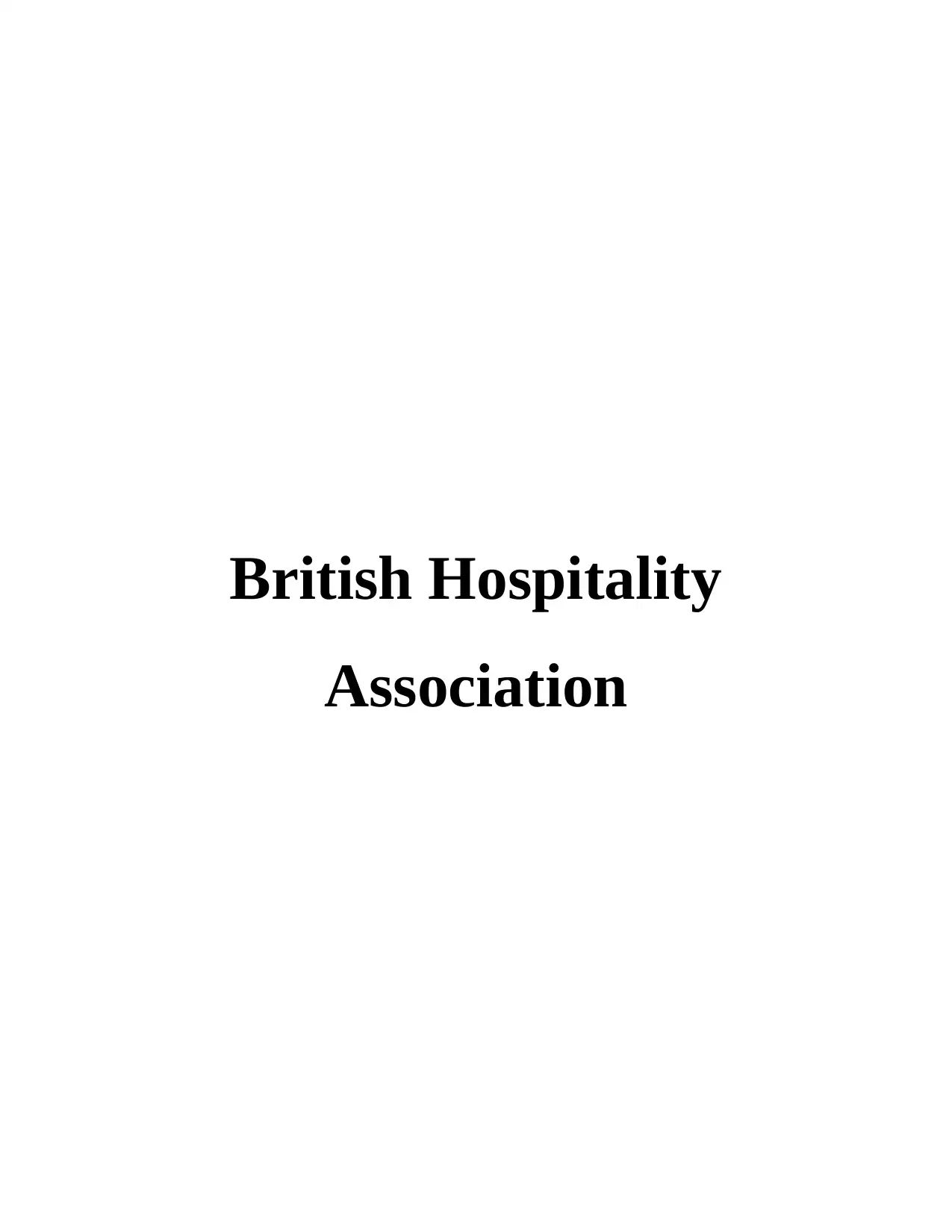
British Hospitality
Association
Association
Paraphrase This Document
Need a fresh take? Get an instant paraphrase of this document with our AI Paraphraser
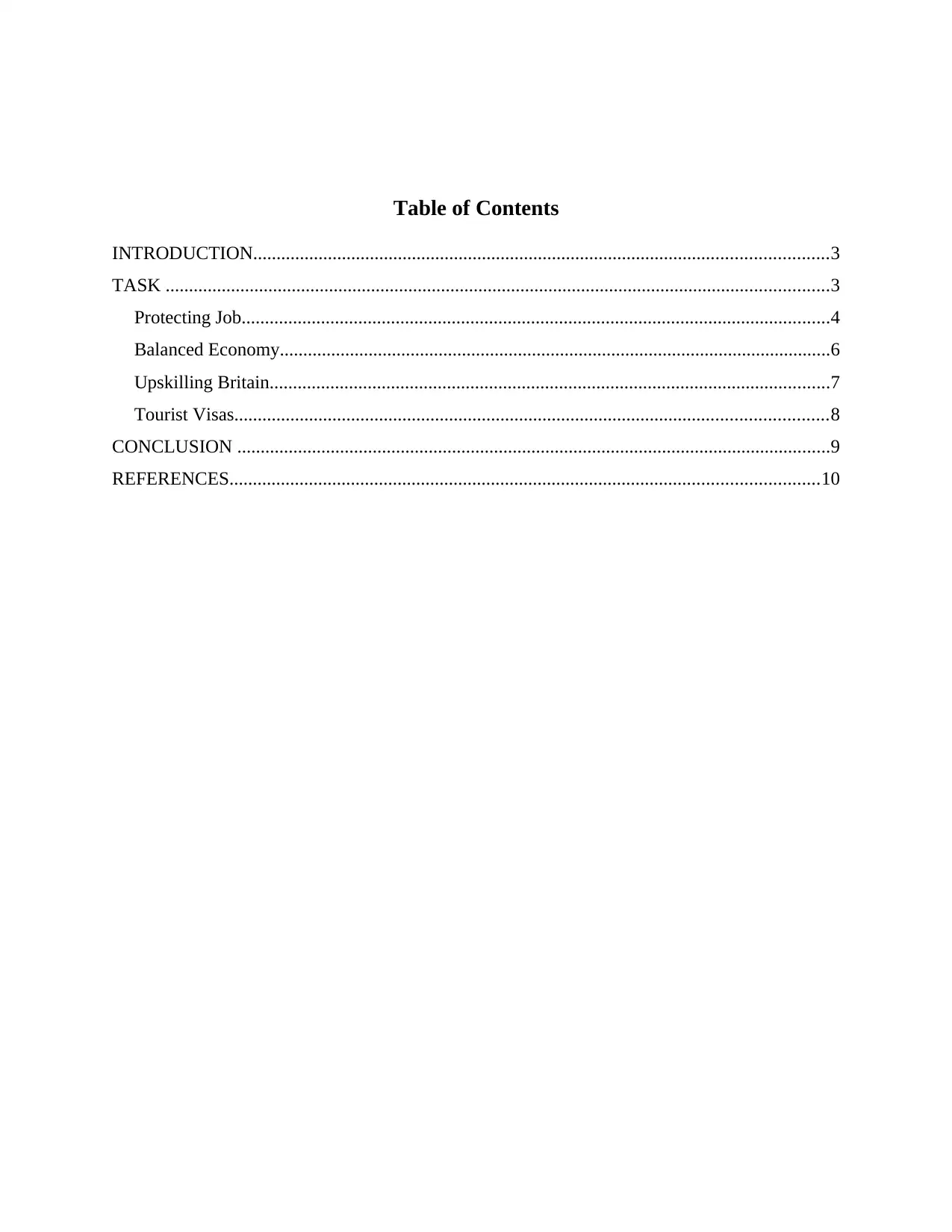
Table of Contents
INTRODUCTION...........................................................................................................................3
TASK ..............................................................................................................................................3
Protecting Job..............................................................................................................................4
Balanced Economy......................................................................................................................6
Upskilling Britain........................................................................................................................7
Tourist Visas...............................................................................................................................8
CONCLUSION ...............................................................................................................................9
REFERENCES..............................................................................................................................10
INTRODUCTION...........................................................................................................................3
TASK ..............................................................................................................................................3
Protecting Job..............................................................................................................................4
Balanced Economy......................................................................................................................6
Upskilling Britain........................................................................................................................7
Tourist Visas...............................................................................................................................8
CONCLUSION ...............................................................................................................................9
REFERENCES..............................................................................................................................10
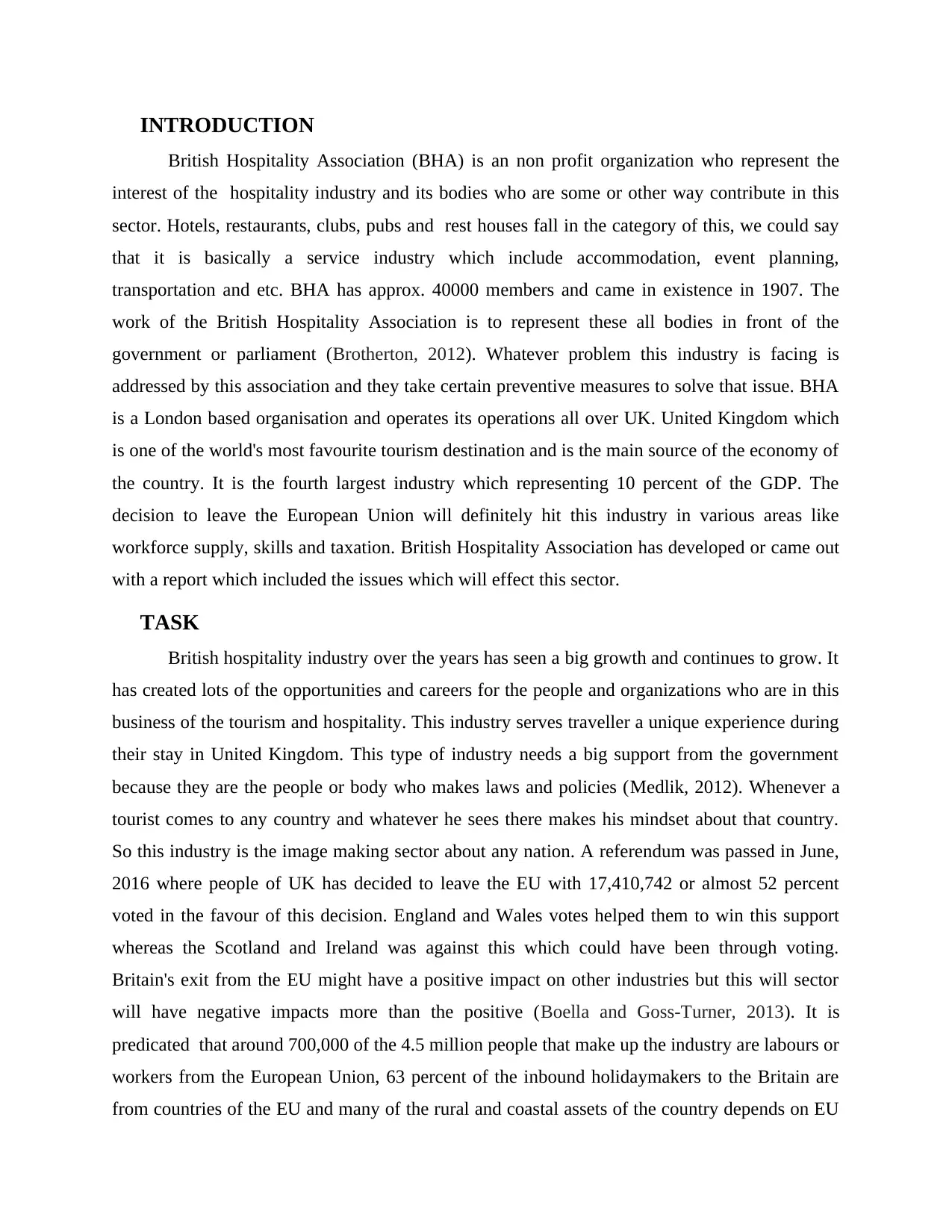
INTRODUCTION
British Hospitality Association (BHA) is an non profit organization who represent the
interest of the hospitality industry and its bodies who are some or other way contribute in this
sector. Hotels, restaurants, clubs, pubs and rest houses fall in the category of this, we could say
that it is basically a service industry which include accommodation, event planning,
transportation and etc. BHA has approx. 40000 members and came in existence in 1907. The
work of the British Hospitality Association is to represent these all bodies in front of the
government or parliament (Brotherton, 2012). Whatever problem this industry is facing is
addressed by this association and they take certain preventive measures to solve that issue. BHA
is a London based organisation and operates its operations all over UK. United Kingdom which
is one of the world's most favourite tourism destination and is the main source of the economy of
the country. It is the fourth largest industry which representing 10 percent of the GDP. The
decision to leave the European Union will definitely hit this industry in various areas like
workforce supply, skills and taxation. British Hospitality Association has developed or came out
with a report which included the issues which will effect this sector.
TASK
British hospitality industry over the years has seen a big growth and continues to grow. It
has created lots of the opportunities and careers for the people and organizations who are in this
business of the tourism and hospitality. This industry serves traveller a unique experience during
their stay in United Kingdom. This type of industry needs a big support from the government
because they are the people or body who makes laws and policies (Medlik, 2012). Whenever a
tourist comes to any country and whatever he sees there makes his mindset about that country.
So this industry is the image making sector about any nation. A referendum was passed in June,
2016 where people of UK has decided to leave the EU with 17,410,742 or almost 52 percent
voted in the favour of this decision. England and Wales votes helped them to win this support
whereas the Scotland and Ireland was against this which could have been through voting.
Britain's exit from the EU might have a positive impact on other industries but this will sector
will have negative impacts more than the positive (Boella and Goss-Turner, 2013). It is
predicated that around 700,000 of the 4.5 million people that make up the industry are labours or
workers from the European Union, 63 percent of the inbound holidaymakers to the Britain are
from countries of the EU and many of the rural and coastal assets of the country depends on EU
British Hospitality Association (BHA) is an non profit organization who represent the
interest of the hospitality industry and its bodies who are some or other way contribute in this
sector. Hotels, restaurants, clubs, pubs and rest houses fall in the category of this, we could say
that it is basically a service industry which include accommodation, event planning,
transportation and etc. BHA has approx. 40000 members and came in existence in 1907. The
work of the British Hospitality Association is to represent these all bodies in front of the
government or parliament (Brotherton, 2012). Whatever problem this industry is facing is
addressed by this association and they take certain preventive measures to solve that issue. BHA
is a London based organisation and operates its operations all over UK. United Kingdom which
is one of the world's most favourite tourism destination and is the main source of the economy of
the country. It is the fourth largest industry which representing 10 percent of the GDP. The
decision to leave the European Union will definitely hit this industry in various areas like
workforce supply, skills and taxation. British Hospitality Association has developed or came out
with a report which included the issues which will effect this sector.
TASK
British hospitality industry over the years has seen a big growth and continues to grow. It
has created lots of the opportunities and careers for the people and organizations who are in this
business of the tourism and hospitality. This industry serves traveller a unique experience during
their stay in United Kingdom. This type of industry needs a big support from the government
because they are the people or body who makes laws and policies (Medlik, 2012). Whenever a
tourist comes to any country and whatever he sees there makes his mindset about that country.
So this industry is the image making sector about any nation. A referendum was passed in June,
2016 where people of UK has decided to leave the EU with 17,410,742 or almost 52 percent
voted in the favour of this decision. England and Wales votes helped them to win this support
whereas the Scotland and Ireland was against this which could have been through voting.
Britain's exit from the EU might have a positive impact on other industries but this will sector
will have negative impacts more than the positive (Boella and Goss-Turner, 2013). It is
predicated that around 700,000 of the 4.5 million people that make up the industry are labours or
workers from the European Union, 63 percent of the inbound holidaymakers to the Britain are
from countries of the EU and many of the rural and coastal assets of the country depends on EU
⊘ This is a preview!⊘
Do you want full access?
Subscribe today to unlock all pages.

Trusted by 1+ million students worldwide
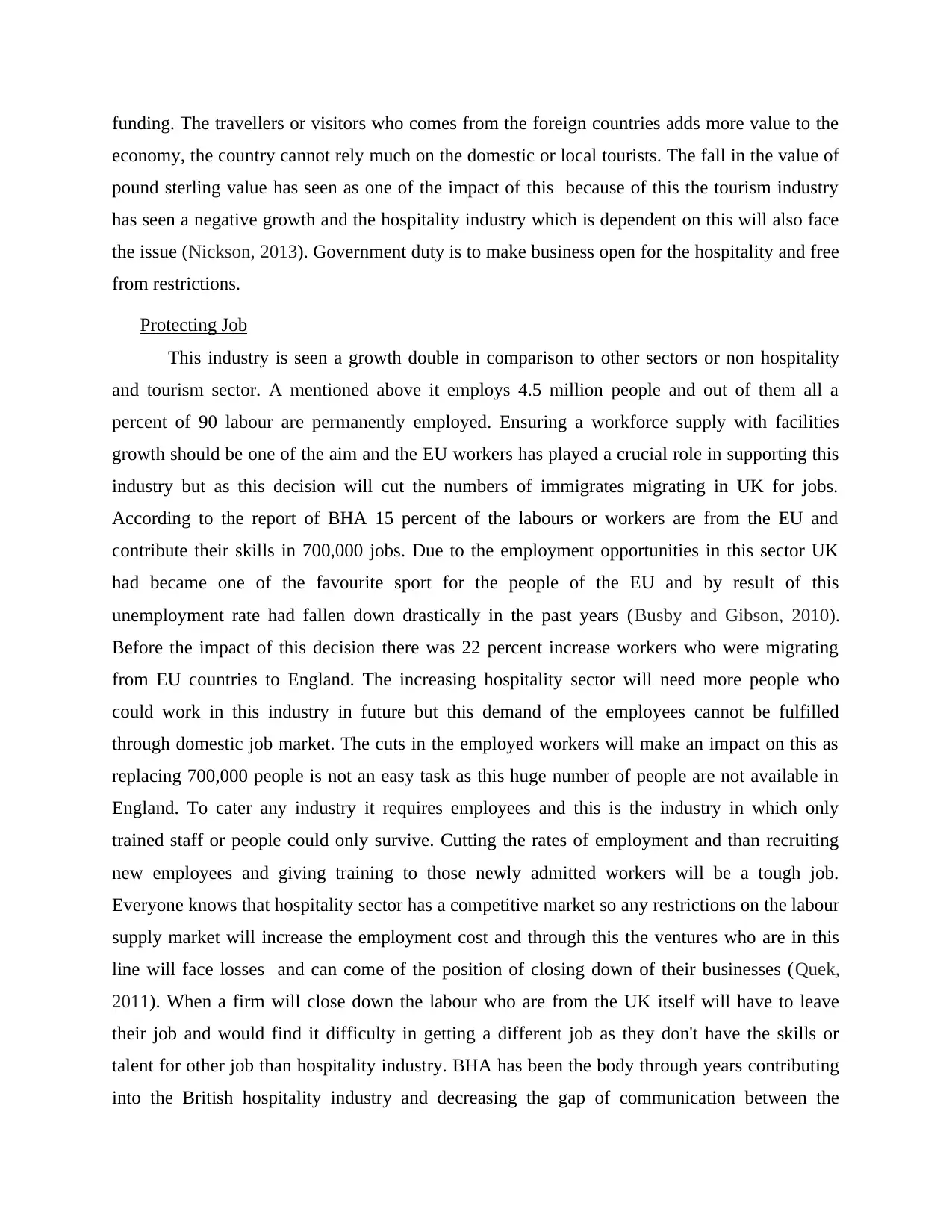
funding. The travellers or visitors who comes from the foreign countries adds more value to the
economy, the country cannot rely much on the domestic or local tourists. The fall in the value of
pound sterling value has seen as one of the impact of this because of this the tourism industry
has seen a negative growth and the hospitality industry which is dependent on this will also face
the issue (Nickson, 2013). Government duty is to make business open for the hospitality and free
from restrictions.
Protecting Job
This industry is seen a growth double in comparison to other sectors or non hospitality
and tourism sector. A mentioned above it employs 4.5 million people and out of them all a
percent of 90 labour are permanently employed. Ensuring a workforce supply with facilities
growth should be one of the aim and the EU workers has played a crucial role in supporting this
industry but as this decision will cut the numbers of immigrates migrating in UK for jobs.
According to the report of BHA 15 percent of the labours or workers are from the EU and
contribute their skills in 700,000 jobs. Due to the employment opportunities in this sector UK
had became one of the favourite sport for the people of the EU and by result of this
unemployment rate had fallen down drastically in the past years (Busby and Gibson, 2010).
Before the impact of this decision there was 22 percent increase workers who were migrating
from EU countries to England. The increasing hospitality sector will need more people who
could work in this industry in future but this demand of the employees cannot be fulfilled
through domestic job market. The cuts in the employed workers will make an impact on this as
replacing 700,000 people is not an easy task as this huge number of people are not available in
England. To cater any industry it requires employees and this is the industry in which only
trained staff or people could only survive. Cutting the rates of employment and than recruiting
new employees and giving training to those newly admitted workers will be a tough job.
Everyone knows that hospitality sector has a competitive market so any restrictions on the labour
supply market will increase the employment cost and through this the ventures who are in this
line will face losses and can come of the position of closing down of their businesses (Quek,
2011). When a firm will close down the labour who are from the UK itself will have to leave
their job and would find it difficulty in getting a different job as they don't have the skills or
talent for other job than hospitality industry. BHA has been the body through years contributing
into the British hospitality industry and decreasing the gap of communication between the
economy, the country cannot rely much on the domestic or local tourists. The fall in the value of
pound sterling value has seen as one of the impact of this because of this the tourism industry
has seen a negative growth and the hospitality industry which is dependent on this will also face
the issue (Nickson, 2013). Government duty is to make business open for the hospitality and free
from restrictions.
Protecting Job
This industry is seen a growth double in comparison to other sectors or non hospitality
and tourism sector. A mentioned above it employs 4.5 million people and out of them all a
percent of 90 labour are permanently employed. Ensuring a workforce supply with facilities
growth should be one of the aim and the EU workers has played a crucial role in supporting this
industry but as this decision will cut the numbers of immigrates migrating in UK for jobs.
According to the report of BHA 15 percent of the labours or workers are from the EU and
contribute their skills in 700,000 jobs. Due to the employment opportunities in this sector UK
had became one of the favourite sport for the people of the EU and by result of this
unemployment rate had fallen down drastically in the past years (Busby and Gibson, 2010).
Before the impact of this decision there was 22 percent increase workers who were migrating
from EU countries to England. The increasing hospitality sector will need more people who
could work in this industry in future but this demand of the employees cannot be fulfilled
through domestic job market. The cuts in the employed workers will make an impact on this as
replacing 700,000 people is not an easy task as this huge number of people are not available in
England. To cater any industry it requires employees and this is the industry in which only
trained staff or people could only survive. Cutting the rates of employment and than recruiting
new employees and giving training to those newly admitted workers will be a tough job.
Everyone knows that hospitality sector has a competitive market so any restrictions on the labour
supply market will increase the employment cost and through this the ventures who are in this
line will face losses and can come of the position of closing down of their businesses (Quek,
2011). When a firm will close down the labour who are from the UK itself will have to leave
their job and would find it difficulty in getting a different job as they don't have the skills or
talent for other job than hospitality industry. BHA has been the body through years contributing
into the British hospitality industry and decreasing the gap of communication between the
Paraphrase This Document
Need a fresh take? Get an instant paraphrase of this document with our AI Paraphraser
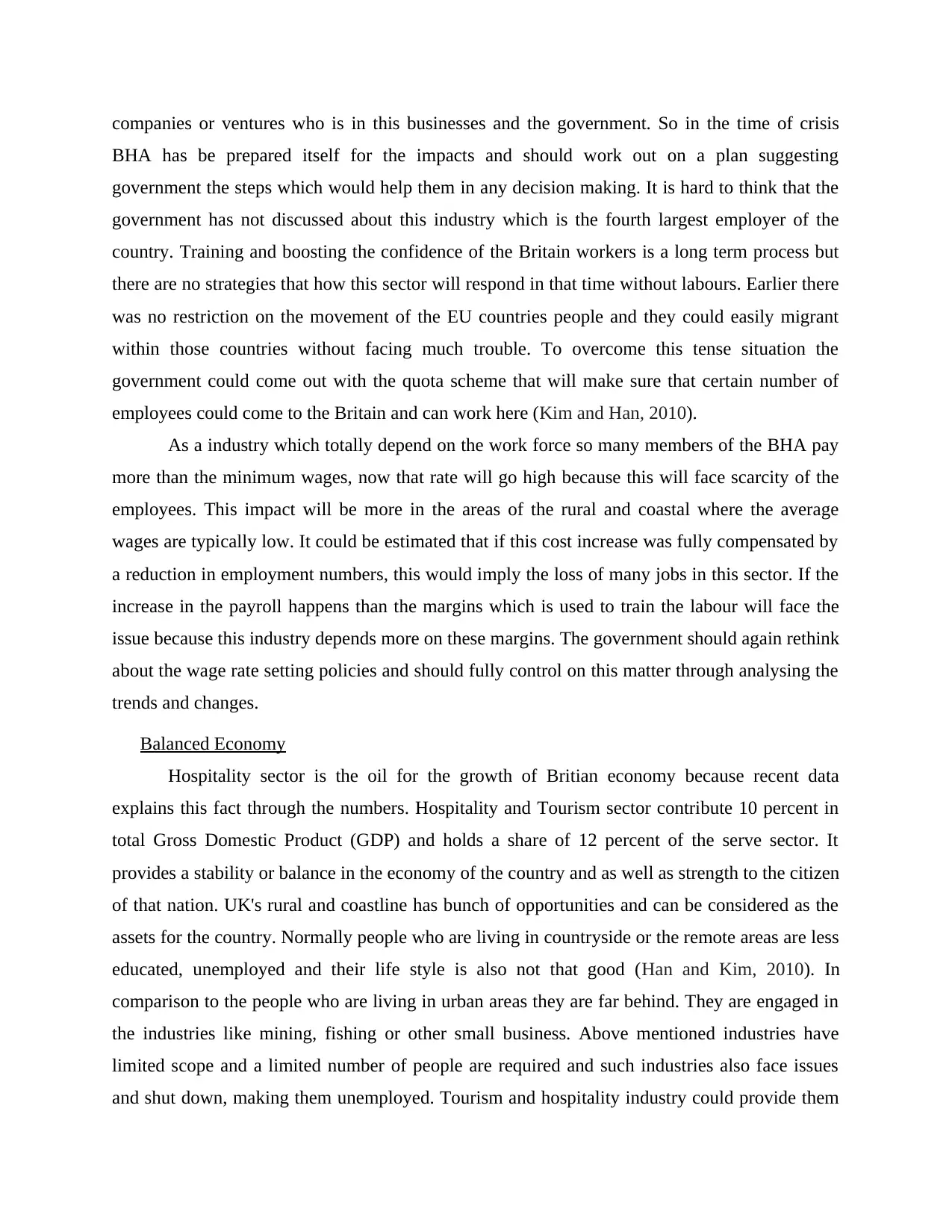
companies or ventures who is in this businesses and the government. So in the time of crisis
BHA has be prepared itself for the impacts and should work out on a plan suggesting
government the steps which would help them in any decision making. It is hard to think that the
government has not discussed about this industry which is the fourth largest employer of the
country. Training and boosting the confidence of the Britain workers is a long term process but
there are no strategies that how this sector will respond in that time without labours. Earlier there
was no restriction on the movement of the EU countries people and they could easily migrant
within those countries without facing much trouble. To overcome this tense situation the
government could come out with the quota scheme that will make sure that certain number of
employees could come to the Britain and can work here (Kim and Han, 2010).
As a industry which totally depend on the work force so many members of the BHA pay
more than the minimum wages, now that rate will go high because this will face scarcity of the
employees. This impact will be more in the areas of the rural and coastal where the average
wages are typically low. It could be estimated that if this cost increase was fully compensated by
a reduction in employment numbers, this would imply the loss of many jobs in this sector. If the
increase in the payroll happens than the margins which is used to train the labour will face the
issue because this industry depends more on these margins. The government should again rethink
about the wage rate setting policies and should fully control on this matter through analysing the
trends and changes.
Balanced Economy
Hospitality sector is the oil for the growth of Britian economy because recent data
explains this fact through the numbers. Hospitality and Tourism sector contribute 10 percent in
total Gross Domestic Product (GDP) and holds a share of 12 percent of the serve sector. It
provides a stability or balance in the economy of the country and as well as strength to the citizen
of that nation. UK's rural and coastline has bunch of opportunities and can be considered as the
assets for the country. Normally people who are living in countryside or the remote areas are less
educated, unemployed and their life style is also not that good (Han and Kim, 2010). In
comparison to the people who are living in urban areas they are far behind. They are engaged in
the industries like mining, fishing or other small business. Above mentioned industries have
limited scope and a limited number of people are required and such industries also face issues
and shut down, making them unemployed. Tourism and hospitality industry could provide them
BHA has be prepared itself for the impacts and should work out on a plan suggesting
government the steps which would help them in any decision making. It is hard to think that the
government has not discussed about this industry which is the fourth largest employer of the
country. Training and boosting the confidence of the Britain workers is a long term process but
there are no strategies that how this sector will respond in that time without labours. Earlier there
was no restriction on the movement of the EU countries people and they could easily migrant
within those countries without facing much trouble. To overcome this tense situation the
government could come out with the quota scheme that will make sure that certain number of
employees could come to the Britain and can work here (Kim and Han, 2010).
As a industry which totally depend on the work force so many members of the BHA pay
more than the minimum wages, now that rate will go high because this will face scarcity of the
employees. This impact will be more in the areas of the rural and coastal where the average
wages are typically low. It could be estimated that if this cost increase was fully compensated by
a reduction in employment numbers, this would imply the loss of many jobs in this sector. If the
increase in the payroll happens than the margins which is used to train the labour will face the
issue because this industry depends more on these margins. The government should again rethink
about the wage rate setting policies and should fully control on this matter through analysing the
trends and changes.
Balanced Economy
Hospitality sector is the oil for the growth of Britian economy because recent data
explains this fact through the numbers. Hospitality and Tourism sector contribute 10 percent in
total Gross Domestic Product (GDP) and holds a share of 12 percent of the serve sector. It
provides a stability or balance in the economy of the country and as well as strength to the citizen
of that nation. UK's rural and coastline has bunch of opportunities and can be considered as the
assets for the country. Normally people who are living in countryside or the remote areas are less
educated, unemployed and their life style is also not that good (Han and Kim, 2010). In
comparison to the people who are living in urban areas they are far behind. They are engaged in
the industries like mining, fishing or other small business. Above mentioned industries have
limited scope and a limited number of people are required and such industries also face issues
and shut down, making them unemployed. Tourism and hospitality industry could provide them
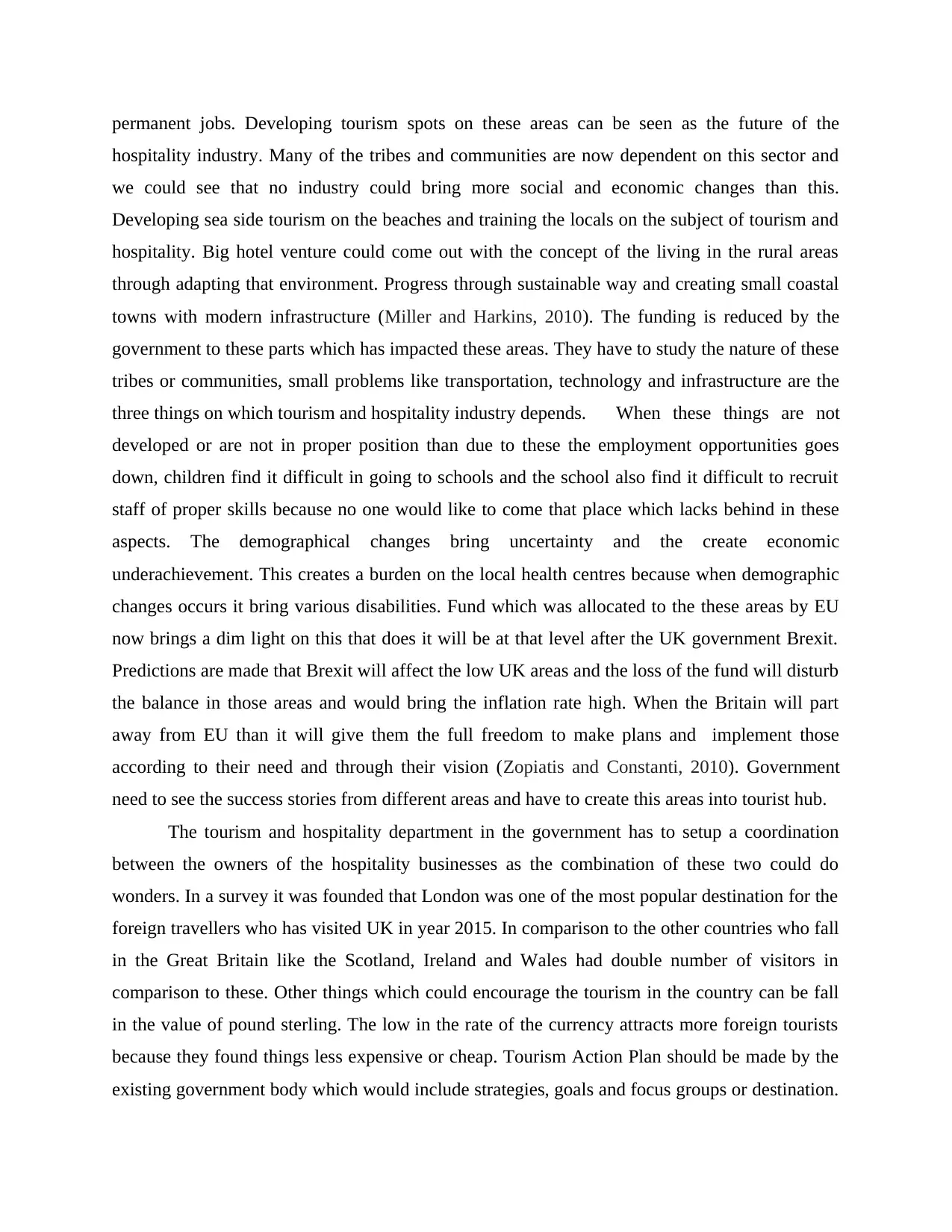
permanent jobs. Developing tourism spots on these areas can be seen as the future of the
hospitality industry. Many of the tribes and communities are now dependent on this sector and
we could see that no industry could bring more social and economic changes than this.
Developing sea side tourism on the beaches and training the locals on the subject of tourism and
hospitality. Big hotel venture could come out with the concept of the living in the rural areas
through adapting that environment. Progress through sustainable way and creating small coastal
towns with modern infrastructure (Miller and Harkins, 2010). The funding is reduced by the
government to these parts which has impacted these areas. They have to study the nature of these
tribes or communities, small problems like transportation, technology and infrastructure are the
three things on which tourism and hospitality industry depends. When these things are not
developed or are not in proper position than due to these the employment opportunities goes
down, children find it difficult in going to schools and the school also find it difficult to recruit
staff of proper skills because no one would like to come that place which lacks behind in these
aspects. The demographical changes bring uncertainty and the create economic
underachievement. This creates a burden on the local health centres because when demographic
changes occurs it bring various disabilities. Fund which was allocated to the these areas by EU
now brings a dim light on this that does it will be at that level after the UK government Brexit.
Predictions are made that Brexit will affect the low UK areas and the loss of the fund will disturb
the balance in those areas and would bring the inflation rate high. When the Britain will part
away from EU than it will give them the full freedom to make plans and implement those
according to their need and through their vision (Zopiatis and Constanti, 2010). Government
need to see the success stories from different areas and have to create this areas into tourist hub.
The tourism and hospitality department in the government has to setup a coordination
between the owners of the hospitality businesses as the combination of these two could do
wonders. In a survey it was founded that London was one of the most popular destination for the
foreign travellers who has visited UK in year 2015. In comparison to the other countries who fall
in the Great Britain like the Scotland, Ireland and Wales had double number of visitors in
comparison to these. Other things which could encourage the tourism in the country can be fall
in the value of pound sterling. The low in the rate of the currency attracts more foreign tourists
because they found things less expensive or cheap. Tourism Action Plan should be made by the
existing government body which would include strategies, goals and focus groups or destination.
hospitality industry. Many of the tribes and communities are now dependent on this sector and
we could see that no industry could bring more social and economic changes than this.
Developing sea side tourism on the beaches and training the locals on the subject of tourism and
hospitality. Big hotel venture could come out with the concept of the living in the rural areas
through adapting that environment. Progress through sustainable way and creating small coastal
towns with modern infrastructure (Miller and Harkins, 2010). The funding is reduced by the
government to these parts which has impacted these areas. They have to study the nature of these
tribes or communities, small problems like transportation, technology and infrastructure are the
three things on which tourism and hospitality industry depends. When these things are not
developed or are not in proper position than due to these the employment opportunities goes
down, children find it difficult in going to schools and the school also find it difficult to recruit
staff of proper skills because no one would like to come that place which lacks behind in these
aspects. The demographical changes bring uncertainty and the create economic
underachievement. This creates a burden on the local health centres because when demographic
changes occurs it bring various disabilities. Fund which was allocated to the these areas by EU
now brings a dim light on this that does it will be at that level after the UK government Brexit.
Predictions are made that Brexit will affect the low UK areas and the loss of the fund will disturb
the balance in those areas and would bring the inflation rate high. When the Britain will part
away from EU than it will give them the full freedom to make plans and implement those
according to their need and through their vision (Zopiatis and Constanti, 2010). Government
need to see the success stories from different areas and have to create this areas into tourist hub.
The tourism and hospitality department in the government has to setup a coordination
between the owners of the hospitality businesses as the combination of these two could do
wonders. In a survey it was founded that London was one of the most popular destination for the
foreign travellers who has visited UK in year 2015. In comparison to the other countries who fall
in the Great Britain like the Scotland, Ireland and Wales had double number of visitors in
comparison to these. Other things which could encourage the tourism in the country can be fall
in the value of pound sterling. The low in the rate of the currency attracts more foreign tourists
because they found things less expensive or cheap. Tourism Action Plan should be made by the
existing government body which would include strategies, goals and focus groups or destination.
⊘ This is a preview!⊘
Do you want full access?
Subscribe today to unlock all pages.

Trusted by 1+ million students worldwide
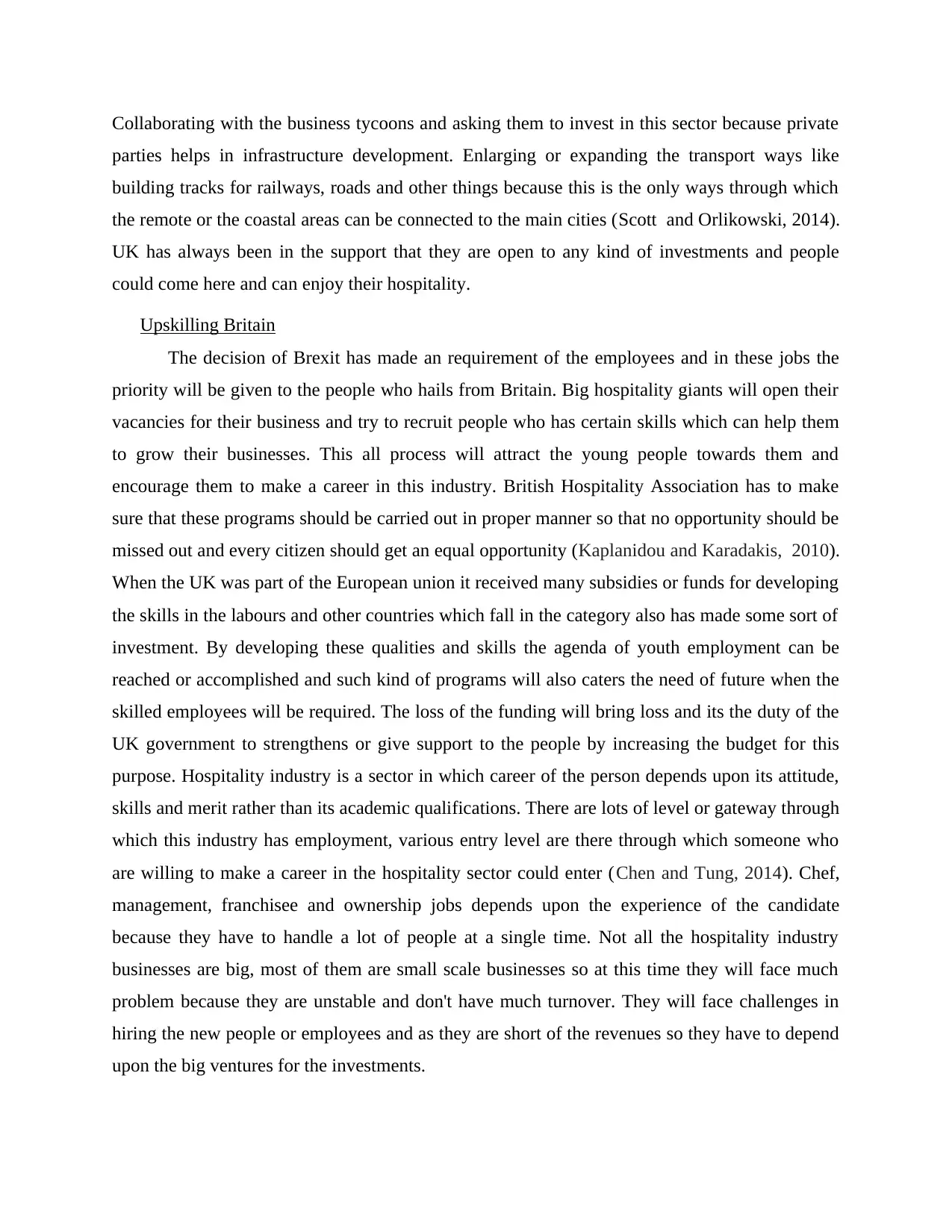
Collaborating with the business tycoons and asking them to invest in this sector because private
parties helps in infrastructure development. Enlarging or expanding the transport ways like
building tracks for railways, roads and other things because this is the only ways through which
the remote or the coastal areas can be connected to the main cities (Scott and Orlikowski, 2014).
UK has always been in the support that they are open to any kind of investments and people
could come here and can enjoy their hospitality.
Upskilling Britain
The decision of Brexit has made an requirement of the employees and in these jobs the
priority will be given to the people who hails from Britain. Big hospitality giants will open their
vacancies for their business and try to recruit people who has certain skills which can help them
to grow their businesses. This all process will attract the young people towards them and
encourage them to make a career in this industry. British Hospitality Association has to make
sure that these programs should be carried out in proper manner so that no opportunity should be
missed out and every citizen should get an equal opportunity (Kaplanidou and Karadakis, 2010).
When the UK was part of the European union it received many subsidies or funds for developing
the skills in the labours and other countries which fall in the category also has made some sort of
investment. By developing these qualities and skills the agenda of youth employment can be
reached or accomplished and such kind of programs will also caters the need of future when the
skilled employees will be required. The loss of the funding will bring loss and its the duty of the
UK government to strengthens or give support to the people by increasing the budget for this
purpose. Hospitality industry is a sector in which career of the person depends upon its attitude,
skills and merit rather than its academic qualifications. There are lots of level or gateway through
which this industry has employment, various entry level are there through which someone who
are willing to make a career in the hospitality sector could enter (Chen and Tung, 2014). Chef,
management, franchisee and ownership jobs depends upon the experience of the candidate
because they have to handle a lot of people at a single time. Not all the hospitality industry
businesses are big, most of them are small scale businesses so at this time they will face much
problem because they are unstable and don't have much turnover. They will face challenges in
hiring the new people or employees and as they are short of the revenues so they have to depend
upon the big ventures for the investments.
parties helps in infrastructure development. Enlarging or expanding the transport ways like
building tracks for railways, roads and other things because this is the only ways through which
the remote or the coastal areas can be connected to the main cities (Scott and Orlikowski, 2014).
UK has always been in the support that they are open to any kind of investments and people
could come here and can enjoy their hospitality.
Upskilling Britain
The decision of Brexit has made an requirement of the employees and in these jobs the
priority will be given to the people who hails from Britain. Big hospitality giants will open their
vacancies for their business and try to recruit people who has certain skills which can help them
to grow their businesses. This all process will attract the young people towards them and
encourage them to make a career in this industry. British Hospitality Association has to make
sure that these programs should be carried out in proper manner so that no opportunity should be
missed out and every citizen should get an equal opportunity (Kaplanidou and Karadakis, 2010).
When the UK was part of the European union it received many subsidies or funds for developing
the skills in the labours and other countries which fall in the category also has made some sort of
investment. By developing these qualities and skills the agenda of youth employment can be
reached or accomplished and such kind of programs will also caters the need of future when the
skilled employees will be required. The loss of the funding will bring loss and its the duty of the
UK government to strengthens or give support to the people by increasing the budget for this
purpose. Hospitality industry is a sector in which career of the person depends upon its attitude,
skills and merit rather than its academic qualifications. There are lots of level or gateway through
which this industry has employment, various entry level are there through which someone who
are willing to make a career in the hospitality sector could enter (Chen and Tung, 2014). Chef,
management, franchisee and ownership jobs depends upon the experience of the candidate
because they have to handle a lot of people at a single time. Not all the hospitality industry
businesses are big, most of them are small scale businesses so at this time they will face much
problem because they are unstable and don't have much turnover. They will face challenges in
hiring the new people or employees and as they are short of the revenues so they have to depend
upon the big ventures for the investments.
Paraphrase This Document
Need a fresh take? Get an instant paraphrase of this document with our AI Paraphraser
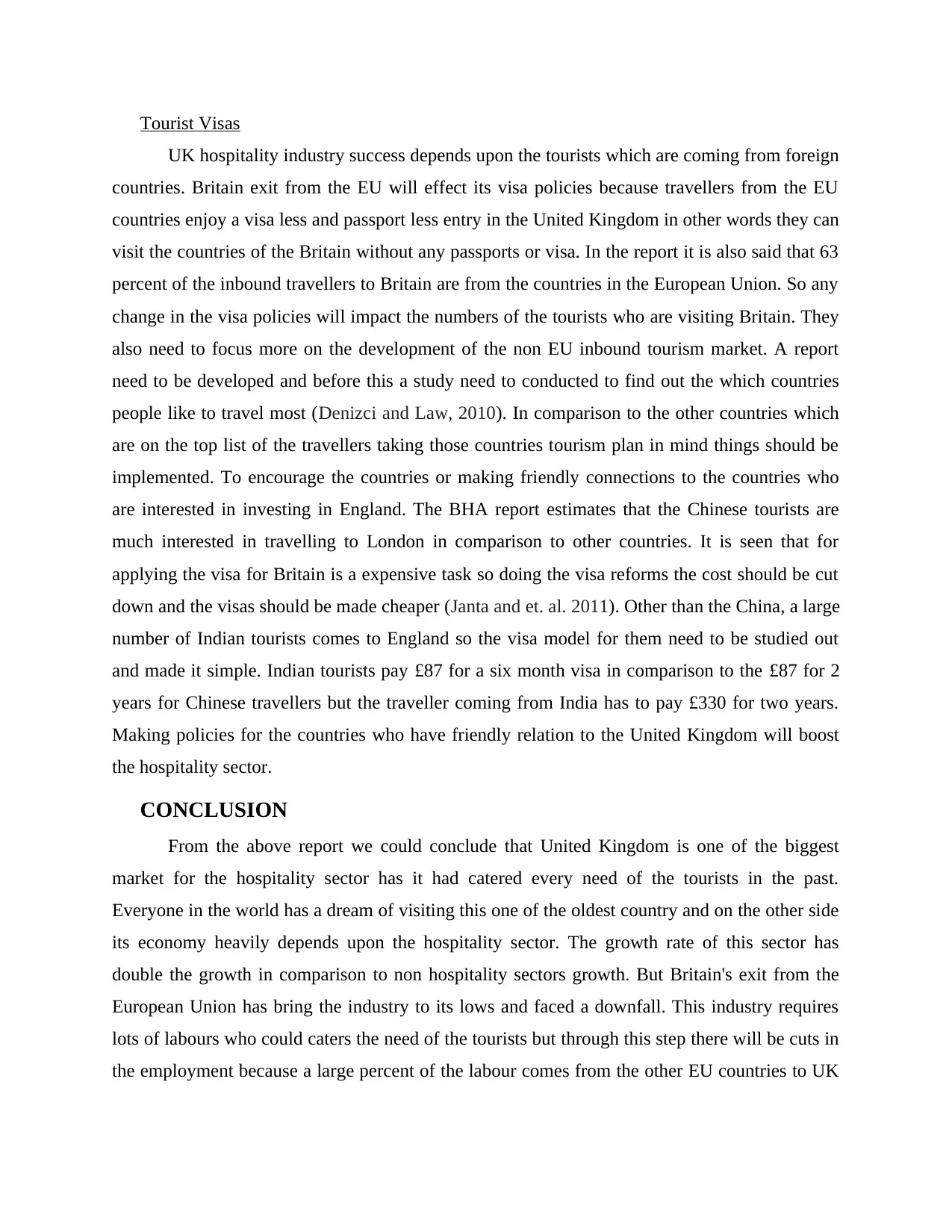
Tourist Visas
UK hospitality industry success depends upon the tourists which are coming from foreign
countries. Britain exit from the EU will effect its visa policies because travellers from the EU
countries enjoy a visa less and passport less entry in the United Kingdom in other words they can
visit the countries of the Britain without any passports or visa. In the report it is also said that 63
percent of the inbound travellers to Britain are from the countries in the European Union. So any
change in the visa policies will impact the numbers of the tourists who are visiting Britain. They
also need to focus more on the development of the non EU inbound tourism market. A report
need to be developed and before this a study need to conducted to find out the which countries
people like to travel most (Denizci and Law, 2010). In comparison to the other countries which
are on the top list of the travellers taking those countries tourism plan in mind things should be
implemented. To encourage the countries or making friendly connections to the countries who
are interested in investing in England. The BHA report estimates that the Chinese tourists are
much interested in travelling to London in comparison to other countries. It is seen that for
applying the visa for Britain is a expensive task so doing the visa reforms the cost should be cut
down and the visas should be made cheaper (Janta and et. al. 2011). Other than the China, a large
number of Indian tourists comes to England so the visa model for them need to be studied out
and made it simple. Indian tourists pay £87 for a six month visa in comparison to the £87 for 2
years for Chinese travellers but the traveller coming from India has to pay £330 for two years.
Making policies for the countries who have friendly relation to the United Kingdom will boost
the hospitality sector.
CONCLUSION
From the above report we could conclude that United Kingdom is one of the biggest
market for the hospitality sector has it had catered every need of the tourists in the past.
Everyone in the world has a dream of visiting this one of the oldest country and on the other side
its economy heavily depends upon the hospitality sector. The growth rate of this sector has
double the growth in comparison to non hospitality sectors growth. But Britain's exit from the
European Union has bring the industry to its lows and faced a downfall. This industry requires
lots of labours who could caters the need of the tourists but through this step there will be cuts in
the employment because a large percent of the labour comes from the other EU countries to UK
UK hospitality industry success depends upon the tourists which are coming from foreign
countries. Britain exit from the EU will effect its visa policies because travellers from the EU
countries enjoy a visa less and passport less entry in the United Kingdom in other words they can
visit the countries of the Britain without any passports or visa. In the report it is also said that 63
percent of the inbound travellers to Britain are from the countries in the European Union. So any
change in the visa policies will impact the numbers of the tourists who are visiting Britain. They
also need to focus more on the development of the non EU inbound tourism market. A report
need to be developed and before this a study need to conducted to find out the which countries
people like to travel most (Denizci and Law, 2010). In comparison to the other countries which
are on the top list of the travellers taking those countries tourism plan in mind things should be
implemented. To encourage the countries or making friendly connections to the countries who
are interested in investing in England. The BHA report estimates that the Chinese tourists are
much interested in travelling to London in comparison to other countries. It is seen that for
applying the visa for Britain is a expensive task so doing the visa reforms the cost should be cut
down and the visas should be made cheaper (Janta and et. al. 2011). Other than the China, a large
number of Indian tourists comes to England so the visa model for them need to be studied out
and made it simple. Indian tourists pay £87 for a six month visa in comparison to the £87 for 2
years for Chinese travellers but the traveller coming from India has to pay £330 for two years.
Making policies for the countries who have friendly relation to the United Kingdom will boost
the hospitality sector.
CONCLUSION
From the above report we could conclude that United Kingdom is one of the biggest
market for the hospitality sector has it had catered every need of the tourists in the past.
Everyone in the world has a dream of visiting this one of the oldest country and on the other side
its economy heavily depends upon the hospitality sector. The growth rate of this sector has
double the growth in comparison to non hospitality sectors growth. But Britain's exit from the
European Union has bring the industry to its lows and faced a downfall. This industry requires
lots of labours who could caters the need of the tourists but through this step there will be cuts in
the employment because a large percent of the labour comes from the other EU countries to UK

for employment. This line will face the shortage of the staff and the skilled labour. Government
needs to work on its visa policies so that they could attract more and more tourist to Britain.
needs to work on its visa policies so that they could attract more and more tourist to Britain.
⊘ This is a preview!⊘
Do you want full access?
Subscribe today to unlock all pages.

Trusted by 1+ million students worldwide
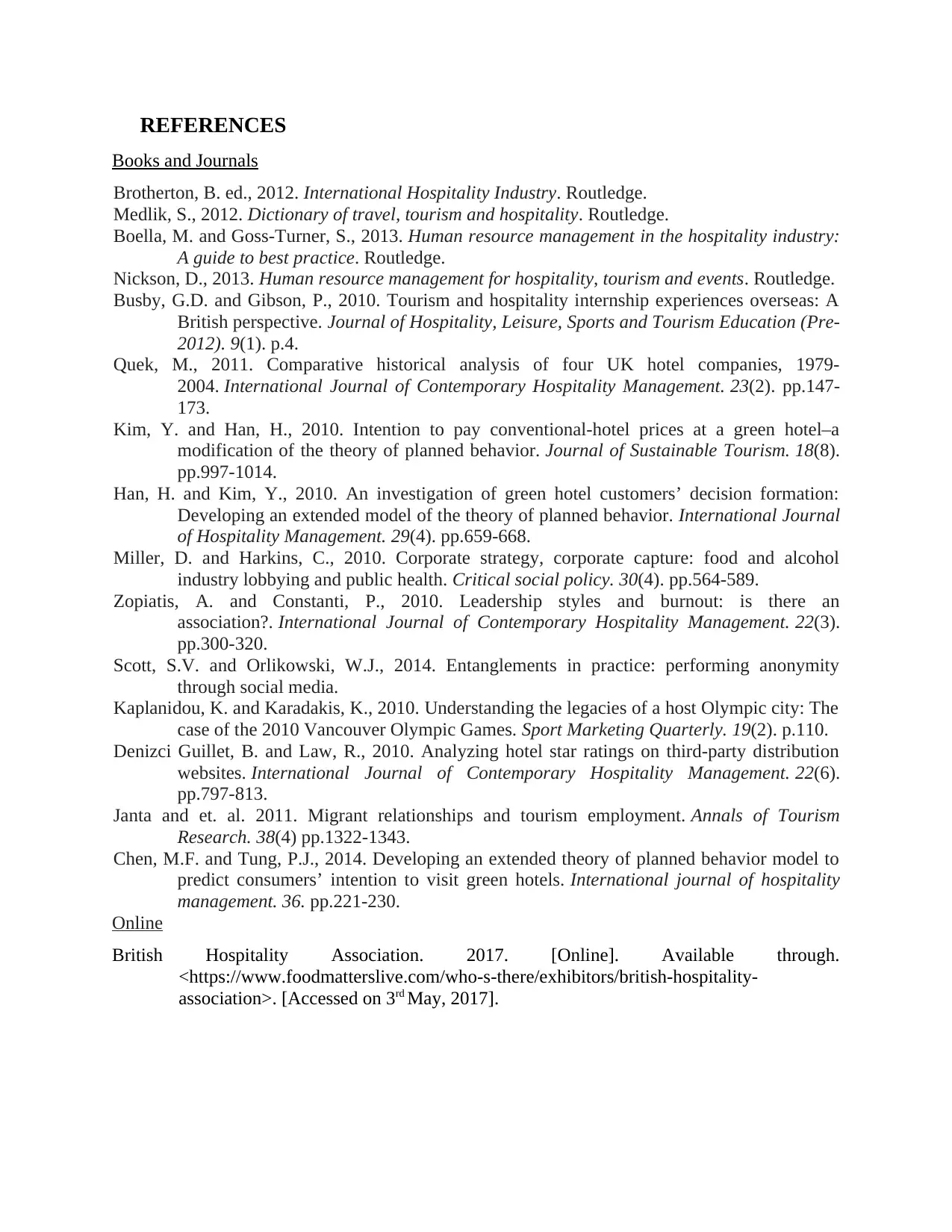
REFERENCES
Books and Journals
Brotherton, B. ed., 2012. International Hospitality Industry. Routledge.
Medlik, S., 2012. Dictionary of travel, tourism and hospitality. Routledge.
Boella, M. and Goss-Turner, S., 2013. Human resource management in the hospitality industry:
A guide to best practice. Routledge.
Nickson, D., 2013. Human resource management for hospitality, tourism and events. Routledge.
Busby, G.D. and Gibson, P., 2010. Tourism and hospitality internship experiences overseas: A
British perspective. Journal of Hospitality, Leisure, Sports and Tourism Education (Pre-
2012). 9(1). p.4.
Quek, M., 2011. Comparative historical analysis of four UK hotel companies, 1979-
2004. International Journal of Contemporary Hospitality Management. 23(2). pp.147-
173.
Kim, Y. and Han, H., 2010. Intention to pay conventional-hotel prices at a green hotel–a
modification of the theory of planned behavior. Journal of Sustainable Tourism. 18(8).
pp.997-1014.
Han, H. and Kim, Y., 2010. An investigation of green hotel customers’ decision formation:
Developing an extended model of the theory of planned behavior. International Journal
of Hospitality Management. 29(4). pp.659-668.
Miller, D. and Harkins, C., 2010. Corporate strategy, corporate capture: food and alcohol
industry lobbying and public health. Critical social policy. 30(4). pp.564-589.
Zopiatis, A. and Constanti, P., 2010. Leadership styles and burnout: is there an
association?. International Journal of Contemporary Hospitality Management. 22(3).
pp.300-320.
Scott, S.V. and Orlikowski, W.J., 2014. Entanglements in practice: performing anonymity
through social media.
Kaplanidou, K. and Karadakis, K., 2010. Understanding the legacies of a host Olympic city: The
case of the 2010 Vancouver Olympic Games. Sport Marketing Quarterly. 19(2). p.110.
Denizci Guillet, B. and Law, R., 2010. Analyzing hotel star ratings on third-party distribution
websites. International Journal of Contemporary Hospitality Management. 22(6).
pp.797-813.
Janta and et. al. 2011. Migrant relationships and tourism employment. Annals of Tourism
Research. 38(4) pp.1322-1343.
Chen, M.F. and Tung, P.J., 2014. Developing an extended theory of planned behavior model to
predict consumers’ intention to visit green hotels. International journal of hospitality
management. 36. pp.221-230.
Online
British Hospitality Association. 2017. [Online]. Available through.
<https://www.foodmatterslive.com/who-s-there/exhibitors/british-hospitality-
association>. [Accessed on 3rd May, 2017].
Books and Journals
Brotherton, B. ed., 2012. International Hospitality Industry. Routledge.
Medlik, S., 2012. Dictionary of travel, tourism and hospitality. Routledge.
Boella, M. and Goss-Turner, S., 2013. Human resource management in the hospitality industry:
A guide to best practice. Routledge.
Nickson, D., 2013. Human resource management for hospitality, tourism and events. Routledge.
Busby, G.D. and Gibson, P., 2010. Tourism and hospitality internship experiences overseas: A
British perspective. Journal of Hospitality, Leisure, Sports and Tourism Education (Pre-
2012). 9(1). p.4.
Quek, M., 2011. Comparative historical analysis of four UK hotel companies, 1979-
2004. International Journal of Contemporary Hospitality Management. 23(2). pp.147-
173.
Kim, Y. and Han, H., 2010. Intention to pay conventional-hotel prices at a green hotel–a
modification of the theory of planned behavior. Journal of Sustainable Tourism. 18(8).
pp.997-1014.
Han, H. and Kim, Y., 2010. An investigation of green hotel customers’ decision formation:
Developing an extended model of the theory of planned behavior. International Journal
of Hospitality Management. 29(4). pp.659-668.
Miller, D. and Harkins, C., 2010. Corporate strategy, corporate capture: food and alcohol
industry lobbying and public health. Critical social policy. 30(4). pp.564-589.
Zopiatis, A. and Constanti, P., 2010. Leadership styles and burnout: is there an
association?. International Journal of Contemporary Hospitality Management. 22(3).
pp.300-320.
Scott, S.V. and Orlikowski, W.J., 2014. Entanglements in practice: performing anonymity
through social media.
Kaplanidou, K. and Karadakis, K., 2010. Understanding the legacies of a host Olympic city: The
case of the 2010 Vancouver Olympic Games. Sport Marketing Quarterly. 19(2). p.110.
Denizci Guillet, B. and Law, R., 2010. Analyzing hotel star ratings on third-party distribution
websites. International Journal of Contemporary Hospitality Management. 22(6).
pp.797-813.
Janta and et. al. 2011. Migrant relationships and tourism employment. Annals of Tourism
Research. 38(4) pp.1322-1343.
Chen, M.F. and Tung, P.J., 2014. Developing an extended theory of planned behavior model to
predict consumers’ intention to visit green hotels. International journal of hospitality
management. 36. pp.221-230.
Online
British Hospitality Association. 2017. [Online]. Available through.
<https://www.foodmatterslive.com/who-s-there/exhibitors/british-hospitality-
association>. [Accessed on 3rd May, 2017].
1 out of 10
Related Documents
Your All-in-One AI-Powered Toolkit for Academic Success.
+13062052269
info@desklib.com
Available 24*7 on WhatsApp / Email
![[object Object]](/_next/static/media/star-bottom.7253800d.svg)
Unlock your academic potential
Copyright © 2020–2025 A2Z Services. All Rights Reserved. Developed and managed by ZUCOL.





